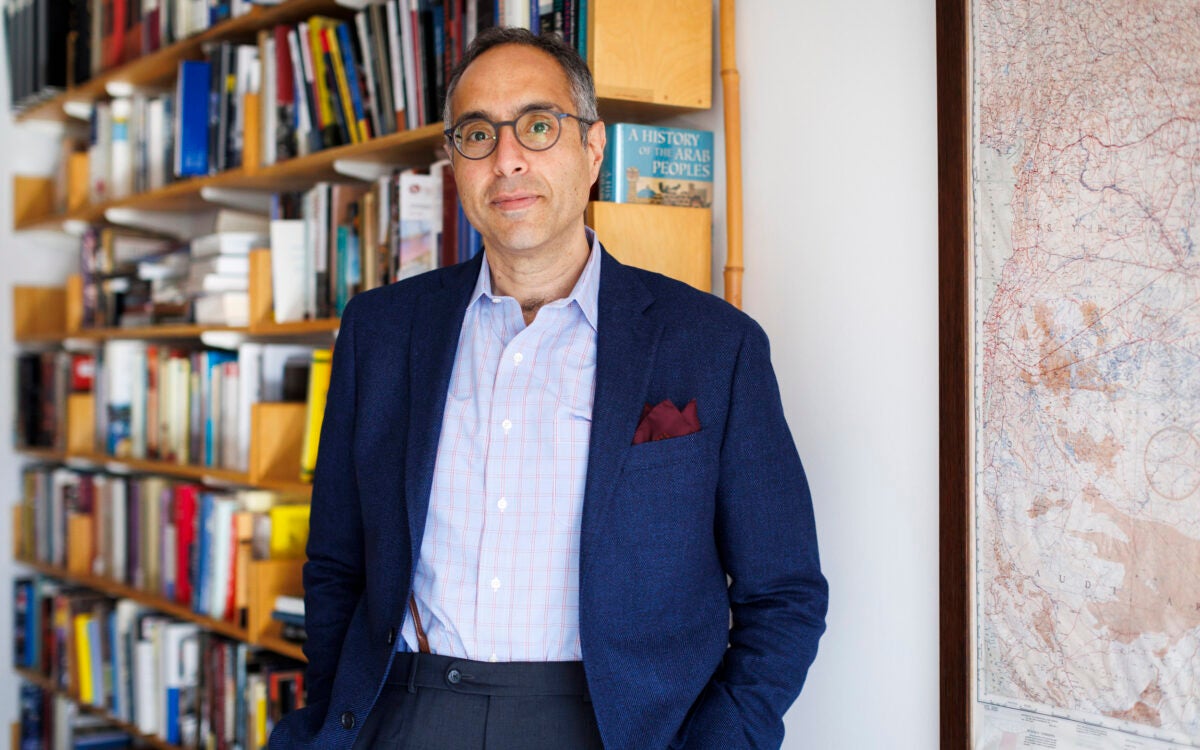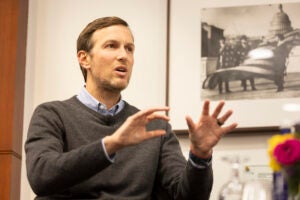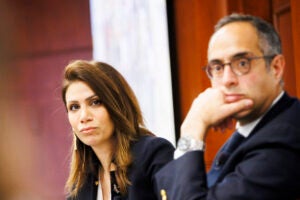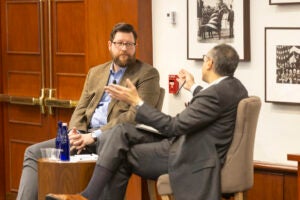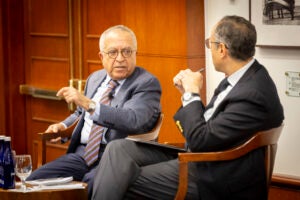An immediate cease-fire in Gaza sounds like a principled idea to those recoiling at the thousands of Palestinian civilians who have died since fighting began in earnest seven months ago, but it would be foolhardy to strike any deal unless it includes the complete dismantling of Hamas, according to journalist Bret Stephens.
The New York Times opinion columnist said he supports a halt in hostilities only if the agreement produces “a good outcome that permanently changes the status quo in Gaza” during a spirited conversation Monday evening at Harvard Kennedy School, the sixth and final installment in the Middle East Dialogues series.
Stephens, who also voiced his concerns about campus protests over the conflict, argued that anything that does not deal with Hamas will inevitably lead to future confrontations, noting the long history of cease-fire agreements that proved only temporary, including the one in place that Hamas violated on Oct. 7.
“Leaving Hamas in power with a cease-fire now or tomorrow is, in my view, a likely recipe for this tragedy to be repeated again and again,” he told Tarek Masoud, Ford Foundation Professor of Democracy and Governance, faculty director of the Middle East Initiative at HKS, and organizer of the series.
More from Middle East Dialogues
“Both of us, and I hope everyone in this room, wants an outcome for the Palestinians that in three or five or 10 years looks a hell of a lot better than it did three or five or however many years ago,” said Stephens. “That outcome is not possible without the elimination of Hamas as a military and political entity” that could reconstitute itself down the road.
Taking out most, but not all, of Hamas is not enough, especially if the Palestinian Authority hopes to reassert power, he said. It cannot do so with a viable Hamas as its rival.
Before joining The Times in 2017, Stephens was a foreign affairs columnist and deputy editorial page editor for The Wall Street Journal and editor in chief of the Jerusalem Post from 2002-2004. He is currently editor of Sapir, a quarterly journal about Jewish cultural and political issues.
“I consider myself a Zionist, and I believe intrinsic to my Zionism is the belief that Zionism is a call for Jewish self-determination, which means that we are not ruled by others and that we do not rule others. Israel should not be in the business of ruling others,” said Stephens, who is Jewish. “If Hamas did not exist tomorrow, then any sensible Israeli government should be working all the time to find a way to separate from the Palestinians with the goal of creating a Palestinian state that is independent, viable, prosperous, progressive.”
Masoud said many believe Hamas is not entirely at fault for this conflict but was provoked into Oct. 7 by Israel’s occupation and ongoing settlement building in the West Bank, its indiscriminate bombing campaign, and other efforts by Israeli Prime Minister Benjamin Netanyahu’s government to thwart Palestinians’ goal of national self-determination.
Stephens rejected the notion that actions like blockades of goods and people in and out of Gaza by Israel, Egypt, and others are to blame for Hamas becoming a violent terrorist organization and for the difficult conditions of life for many in Gaza even before the war, saying it’s “wishful thinking” that things might be better if only Hamas had been treated better. We “insult” Hamas when we downplay the motivational importance of its deeply held belief, embedded in the Hamas charter, calling for the elimination of Israel.
“That is their true belief, and they’ve said so a thousand times,” he said.
While not in favor of settlements “for all sorts of reasons,” Stephens does not believe they are the root cause of this conflict. If they were, when Israel withdrew all its settlements in 2005, life for the Palestinians should have gotten better. In fact, it got worse.
And though Israel’s funding of Hamas under Netanyahu was “wrongheaded” and deserves condemnation, it was not done in isolation, but as part of a broader “policy of appeasement” of Hamas endorsed by the West, including by current and prior U.S. presidential administrations.
The New York Times, The Times of Israel, and other news organizations have reported that Netanyahu’s government aided the funding of Hamas so the group would remain a powerful rival to the Palestinian Authority, which oversaw the West Bank, and reduce odds of a push for a consolidated Palestinian state.
In his Times column and in interviews, Stephens has denounced some pro-Palestinian protests taking place across the country, including on many college campuses like Harvard.
Mere criticisms of the Israeli government’s tactics or of a specific policy is not itself antisemitic, said Stephens, who has written critically of Netanyahu. But “when you say the one Jewish state in the world is the one state you are laser-focused on wanting to see disappear, then I am going to really question where that sentiment is coming from. And if the nature of your critique of Israel mirrors in almost uncannily precise ways older, antisemitic tropes, then I’m also going to raise some questions and quarrels with what you’re saying.”
In response to accusations that some protesters are antisemitic, Masoud said perhaps students ought to confront and engage viewpoints they don’t like or agree with rather than getting upset.
While thicker skin is probably good for everyone to have, universities have established a culture of “safetyism” and set standards around the acceptability of certain types of hurtful speech, Stephens said, but seem to have a different standard when it comes to speech concerning Jews.
His greatest objection to some of the protests is not even the specter of antisemitism.
“It’s the complete lack of nuance. It’s a complete lack of appreciation that maybe there’s more than one side to this, that there’s a history that you might not understand the totality of,” he said.
“And furthermore, if your Jewish friends are telling you again and again [that] what you’re saying is very troubling” and you “make no effort to listen to them” or to reconsider “whether the views I’m expressing, some of the slogans I might be repeating, like ‘from the river to the sea,’ aren’t simply unproblematic calls for freedom, but are, in fact, calls for the elimination of an entire city,” he said. “If you’re not doing this, I would say you shouldn’t be at an institution like Harvard.”
The Middle East Dialogues series hosted Israeli, Palestinian, and American scholars, activists, and political figures sharing different viewpoints on the conflict in Gaza. Prior speakers included Jared Kushner, former senior adviser to former President Donald Trump; Matt Duss, executive director of the Center for International Policy and former foreign policy adviser to Vermont Sen. Bernie Sanders; Dalal Saeb Iriqat, professor of diplomacy and conflict resolution at Arab American University Palestine and columnist for Al-Quds newspaper; Salam Fayyad, former prime minister of the Palestinian Authority; and Einat Wilf, a political scientist and former member of the Knesset.
Source link


